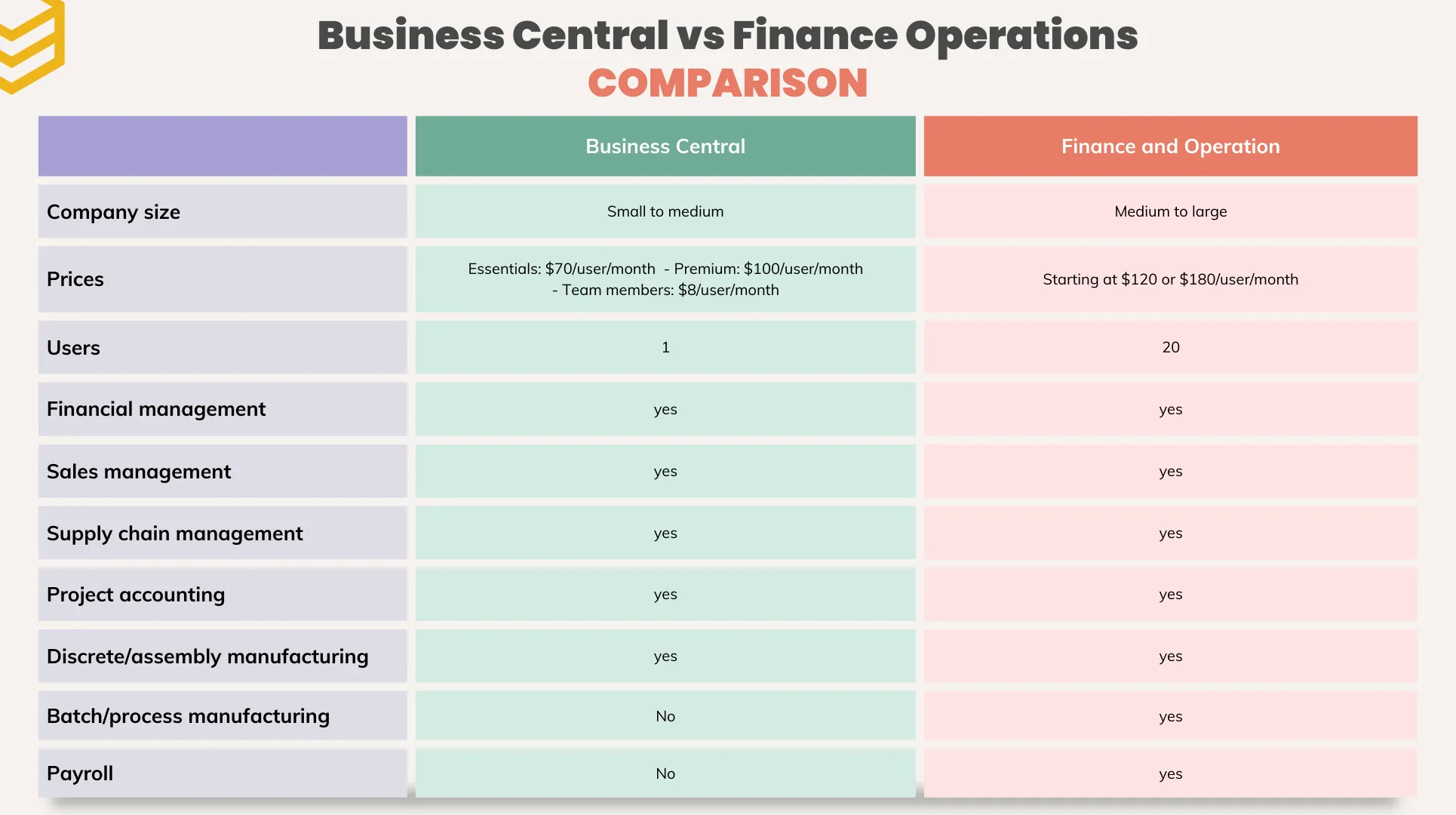Choosing the right ERP solution is crucial for business success. Microsoft Dynamics 365 presents two options: Finance & Operations for large enterprises, offering expansive global features, and Business Central for SMBs, focusing on streamlined efficiency. This comparison between D365 Finance and Operations vs Business Central clarifies their key differences, aiding in the decision-making process for businesses at different scales.
What is Microsoft Dynamics 365 Finance and Operations?

Dynamics 365 Finance & Operations (F&O) is a Microsoft ERP solution designed for large enterprises, offering advanced capabilities for global financial management, operations, supply chain, and manufacturing. It integrates real-time insights, automation, and cloud scalability, enabling businesses to streamline processes, enhance efficiency, and support growth across multiple countries and currencies. D365 Finance & Operation is ideal for organizations aiming for digital transformation and operational excellence.
What is Microsoft Dynamics 365 Business Central?

Dynamics 365 Business Central is a cloud-based ERP solution from Microsoft designed for small to medium-sized businesses (SMBs). It streamlines finance, operations, sales, and service management on a single platform, offering an intuitive interface and easy integration with other Microsoft products. D365 Business Central enables SMBs to improve efficiency, decision-making, and growth with scalable and customizable capabilities, making it an optimal choice for businesses seeking to advance their digital transformation.
Top 7 Different Keys between D365 Finance and Operations vs Business Central

Choosing between Dynamics 365 Finance & Operations and Business Central comes down to key differences in market focus, functionality, implementation, customization, cloud options, global support, and use cases. This guide highlights these critical distinctions to aid businesses in selecting the ERP solution that aligns with their scale and requirements.
D365 Finance and Operations vs Business Central – Market Share and Size
Dynamics 365 Finance & Operations (F&O) targets large enterprises with complex global operations, commanding a significant market share among multinational corporations seeking extensive ERP solutions.
In contrast, Dynamics 365 Business Central (Business Central) is designed for small to medium-sized businesses (SMBs), capturing a broad segment of the market looking for comprehensive, yet scalable ERP tools.
F&O is preferred by organizations needing robust, wide-ranging functionalities, while Business Central appeals to businesses aiming for growth and efficiency with a more straightforward system.
D365 Finance and Operations vs Business Central – Key Functions
D365 F&O offers an expansive suite of features, including advanced financial management, supply chain, manufacturing, and retail capabilities, designed to meet the multifaceted needs of large enterprises.
D365 Business Central, on the other hand, provides essential functionalities like finance, operations, sales, and customer service management, tailored to the streamlined processes of SMBs.
The depth and breadth of functionalities in Dynamics 3655 F&O support complex, global business processes, whereas Dynamics 3655 Business Central focuses on core business needs with simplicity and user-friendliness.
D365 Finance and Operations vs Business Central – Implementation Time and Cost
Implementing D365 F&O is a considerable investment in time and resources, reflecting its complexity and the customization required for large enterprises. The implementation phase for D365 F&O can span several months to over a year.
Conversely, D365 Business Central offers a quicker, more cost-effective implementation process, making it an attractive option for SMBs looking to deploy an ERP solution rapidly and with less upfront investment.
D365 Finance and Operations vs Business Central – Customization and Extensibility
D365 F&O stands out for its high degree of customization and extensibility, catering to large, complex organizations’ unique processes and requirements. It supports extensive modifications and integration with other systems. D365 Business Central, while customizable, emphasizes ease of use and quick adaptation, offering a wide range of add-ons and extensions through Microsoft AppSource to meet specific business needs without extensive custom development.
D365 Finance and Operations vs Business Central – Cloud Infrastructure and Deployment Options
Both Dynamics 365 F&O and Business Central are cloud-native applications optimized for Microsoft Azure. However, Dynamics 365 F&O provides additional flexibility with hybrid deployment options, accommodating businesses with specific data residency or regulatory compliance requirements. Business Central primarily focuses on a cloud-first approach, promoting accessibility and ease of maintenance, with limited on-premise options compared to Dynamics 365 F&O.
D365 Finance and Operations vs Business Central – Global Operations and Compliance
Dynamics 365 F&O is built to support the demands of global operations, offering multi-language, multi-currency, and compliance features across various jurisdictions, making it ideal for multinational corporations. Dynamics 365 Business Central also supports international business activities but with more focused capabilities, making it suited for SMBs that operate across borders but have faceless complexity in compliance and localization requirements.
D365 Finance and Operations vs Business Central – Use Cases
Microsoft Dynamics 365 F&O is best suited for large enterprises with complex manufacturing processes, global supply chains, and a need for comprehensive, customizable ERP solutions. Industries such as manufacturing, retail, and services with multi-site, multinational operations typically benefit from Microsoft Dynamics 365 F&O.
Microsoft Dynamics 365 Business Central is ideal for SMBs requiring a robust, all-in-one ERP solution to streamline financials, sales, service, and operations, particularly appealing to companies in the professional services, wholesale, and retail sectors looking for growth and efficiency.
What is D365 Finance and Operations used for?
Microsoft Dynamics 365 Finance and Operations is designed for medium and large organizations to manage various aspects of business operations. It includes finance, manufacturing, retail, supply chain, and human resources. This comprehensive ERP systems offers a central hub to manage and automate many critical processes. It can lead to increased efficiency, improved decision-making, and ultimately, business growth.
What is D365 Business Central used for?
Microsoft Dynamics 365 Business Central is considered an all-in-one business management solution for small and midsize businesses. It connects with various business departments, such as sales, customer service, finance, and operations, to streamline workflows and communication. D365 Business Central empowers organizations to automate tasks, gain real-time data insight, improve financial control, provide better customer service, and increase business growth.
Conclusion
In conclusion, selecting the right ERP system between Dynamics 365 Finance & Operations and Business Central hinges on understanding their unique features and how they align with your business needs. Finance & Operations suits large enterprises seeking depth and global scalability, while Business Central is ideal for SMBs looking for efficiency and growth. By evaluating their functionality, implementation, customization, and international support differences, businesses can choose the solution that best supports their operational goals and future growth, ensuring streamlined processes and enhanced efficiency.
